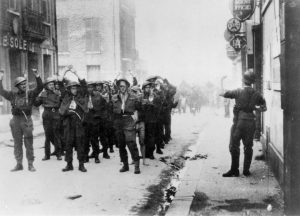
About the time most people in North America were sitting down to dinner that summer day in 1942, a young Canadian whom many of us knew here in Uxbridge, Stephen Bell, was exhausted, bloodied by combat on Dieppe beach and throwing his hands in the air.
“Aufgeben! Aufgeben!” the Germans pointing their weapons at him were shouting.
Bell didn’t speak enough German to know they were shouting “Surrender!” but realized he was still wearing a revolver on his belt. He undid the belt, dropped it to the ground, and again put his hands in the air.
The hit-and-run raid on the French seaport of Dieppe that morning, August 19, 1942, had ended with Bell becoming a prisoner of war; he would spend the rest of the war in various German POW camps. He was one of 1,946 men the German defenders captured that day, more than the whole Canadian Army would lose in Western Europe in almost an entire year of action between D-Day on June 6, 1944, and VE Day on May 8, 1945.
Altogether 3,467 of the nearly 5,000 Canadians who embarked form England that day became casualties. More than 900 of those were killed in the bloodiest nine hours in Canadian military history.
I walked that Dieppe beach last week, leading a Canadian battlefield tour across France and Belgium. And as I’ve learned from hosting over 20 years of similar tours, numbers never truly tell the story of the courage of such men as Stephen Bell (who died in 2009).
But I’m raising the numeracy of battle today because a group of U.S. politicians has verbally insulted this country’s military reputation by throwing numbers at it. Twenty-three American senators, both Republican and Democrat, recently wrote to the prime minister telling him Canada needed to up its ante from 1.76 per cent to two per cent of GDP on defence.
The senators, including Mitt Romney, Ted Cruz, Tim Kaine and Tammy Duckworth, claim they need to out Canada as a laggard nation for not reaching that two per cent commitment.
Well, isn’t that curious. I’m sure Stephen Bell – imprisoned, shackled and starved in German POW camps for the better part of three years – probably would never have considered such things, but on that horrid day at Dieppe in 1942, the number of Canadians on the beach comprised better than 90 per cent of the force ashore, while the 50 U.S. Rangers comprised 0.01 per cent. The Canadians sustained nearly 100 per cent of the casualties.
“As we approach the 2024 NATO summit in Washington, D.C.,” the U.S. Senators proclaimed last Thursday, “we are … profoundly disappointed that Canada’s most recent projection indicated that it will not reach its two per cent commitment this decade.”
This reasoning from a nation that for most of the 20th century preferred islation, not involvement in the world’s problems. In the First World War, Canada declared war on the German invasion of Belgium, the Netherlands and France on August 4, 1914.
It took the United States until April 6, 1917, some 976 days into the war that lasted 1,560 days to respond. Put another way, the Americans only stepped up to defend free Europe for about a third as many days as the Canadians.
Again, I doubt whether Stephen Bell or any of the 1.1 million Canadians (about 10 percent of the entire Canadian population in 1939) who served in the Second World War would bother to say it, but they fought against the fascist forces of Hitler’s Germany, Hirohito’s Japan and Mussolini’s Italy for 2,164 days.
The Americans, who generally forget these things, took up the cause on December 7, 1941, and joined Allied forces for 1,338 of those days of liberating Europe and Asia. Or, to emphasize the point, Canadians stepped up for 100 per cent of the war, Americans about 60 per cent of the war. But who’s counting?
One other point that I suggest the U.S. senators slamming Canada’s military commitment may also have overlooked is this. After the attacks on the World Trade Center in 2001, Canada chose not to participate in the American coalition for regime change in Iraq, but joined the operation to oust oppressive forces of Al-Qaeda and the Taliban from Afghanistan and then the NATO-backed reconstruction of the country.
Which nation, I might therefore ask – the United States or Canada – has the greater respect for the NATO alliance? Perhaps Senators Romney, Cruz, Kaine, Duckworth and the rest ought to study the literacy of history before the throw the numeracy of commitment at Canada.
They tarnish the legacy of soldiers such as Stephen Bell with their carelessness.